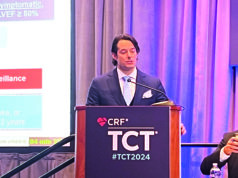
Medtronic has unveiled top line findings of a survey on women’s perceptions and knowledge of risk factors, treatment patterns, and preventive care practices related to heart valve disease.
The survey is endorsed by Women as One and was conducted by Wakefield Research sampling 1,000 women in the United States (USA) aged 50 and older.
“In order to tackle the ever-growing challenges that female patients face in health care, we need to fully understand issues surrounding their awareness and the impact it has on their health,” said Nina Goodheart, senior vice president and president, Structural Heart & Aortic, which is part of the Cardiovascular Portfolio at Medtronic. “Heart valve disease awareness deserves broader attention in the USA, especially considering many women aged 50 and older are at an increased risk of developing the disease. This survey shines a light on the need for increased awareness, early detection, and access to appropriate care for women.”
The survey targeted a diverse sample of women aged 50 and above, with 53% between 50 to 65 years old and 47% aged 66 or older. Notably, 23.5% of respondents were Black or Hispanic, ensuring a nationally representative demographic of US women in this age group.
Findings from the survey highlight a lack of awareness among women about the risks of aortic stenosis (AS) and cardiovascular disease.
Despite the prevalence of cardiovascular disease amongst women, awareness is low, with 26% of women not having heard of any of the most common heart-related conditions such as coronary artery disease, congenital heart disease, heart valve disease, or AS, and only 30% of women aged 50 and older having heard of AS.
Additionally, women of colour have less awareness compared to their white counterparts, with only 10% of Black women and 21% of Hispanic women having heard of AS, compared to 33% of white women.
Even in women who present with risk factors, they are not always referred or screened- highlighting the opportunity to strengthen the referral and preventive screening pathway. In fact, 82% of women above age 65 are living with a chronic condition that increases their risk of aortic stenosis, yet the majority (68%) have never been referred to a cardiologist or taken a heart disease risk assessment.
Women experiencing heart valve disease symptoms such as fatigue and shortness of breath stated the following would prevent them for seeking medical care, with more than two in five citing fear or anxiety about going to the doctor.
For women diagnosed with a medical condition such as heart valve disease and deciding which treatment to pursue, they look to what would work best for them based on several important factors, such as minimally invasive treatment, recovery time, and doctor recommendation.
When selecting the top three factors they consider, close to half (45%) include a minimally invasive procedure such as transcatheter aortic valve implantation (TAVI).
Additionally, the majority (75%) of women surveyed are very or extremely likely to ask their doctor about a different treatment option if they learn of one that is shown to be more effective in women than the one their doctor recommended.
“When compared to male patients, female patients often present with more advanced symptoms of heart valve disease highlighting the importance of uncovering how we can best educate women on early warning signs and treatment options sooner,” stated Roxana Mehran, co-founder and president of Women as One. “These survey findings grant us the opportunity to develop better partnerships with communities experiencing the most inequities and provide a pathway to refining policies and systems that will lead to better care.”
Driving change to address inequities in healthcare cannot be done alone. When it comes to heart valve disease in women, Medtronic is proud to partner with our clinical community and organisations like Women as One to identify opportunities to improve health equity outcomes,” added Goodheart. “Today at the American College of Cardiology scientific session, we look forward to further demonstrating this commitment with the results of our SMART trial, our latest effort to address the underrepresentation of women in cardiovascular health research.”













